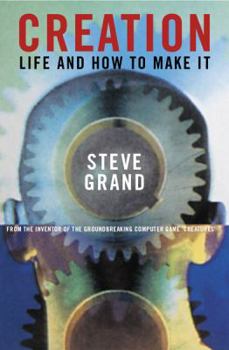Creation: Life and How to Make It
Select Format
Select Condition 
Book Overview
Related Subjects
Artificial Intelligence Artificial Life Biological Sciences Biology Biology & Life Sciences Biotechnology Computer Mathematics Computer Science Computer Technology Computers Computers & Technology Engineering Evolution Games & Strategy Guides Human Vision & Language Systems Modeling & Simulation Philosophy Politics & Social Sciences Robotics Science Science & Math Science & Scientists Science & Technology TextbooksCustomer Reviews
Rated 5 starsTurning the tide on AI research in a sense
I must say I enjoyed the book completely. While I don't agree with the author on all points - the book is incredibly thought provoking. I was so glad to see such a book written that after I read the book (in 3 nights - short book) I bought three copies for co-workers who I wanted to read it. Steve Grand is now quite famous (or should I say even more famous) after writing this book. He has challenged traditional thought on...
0Report
Rated 5 starsBest digital biology/artificial life book I've seen yet.
This book is fantastic. I wasn't really sure what to expect when I got it, but was pleasantly surprised. Before this I read 'Digital Biology' by Peter Bentley, and this book was much more interesting. No, they don't cover exactly the same subject matter, and Bentley's book covers a broader range of subjects, but if you're looking at both of them, I think this is a better intro to artificial life and digital biology.Grand is...
0Report
Rated 5 starsInsights from the creator of Creatures.
I loved this book for many reasons. I have been intrigued by all things artificial life and artificial intelligence for a long time. I have a computer science degree in which I specialized in Artificial Intelligence (Neural Networks, genetic algorithms and parallel computation).Creatures the game from Cyberlife was something that fascinated me, being able to actually watch these little creatures "evolve", "learn", "think"...
0Report
Rated 5 starsSteve Grand's surprising success
The seemingly impossible-to-deliver promise made by its subtitle ("Life and How to Make It") is reason enough to read this book. And to a significant extent the author does indeed accomplish his task of giving you the recipe to create life. Steve Grand starts by shifting your mindset away from the traditional materialistic assumption that only material objects are real and everything else has an inferior level of existence...
0Report
Rated 5 starsan absolute must read
This book is brilliant and so is Steve Grand!Using synthetic approache of complexity theory, Steve Grand goes on to describe his first attempt at really making something intelligent. The beings from his game Creatures are made out of simulated neurons and chemicals, that come together in an attempt to simulated real intelligence.With great wisdom and wit, without wasting a word, in 200 pages Steve Grand does what volumes of...
0Report












